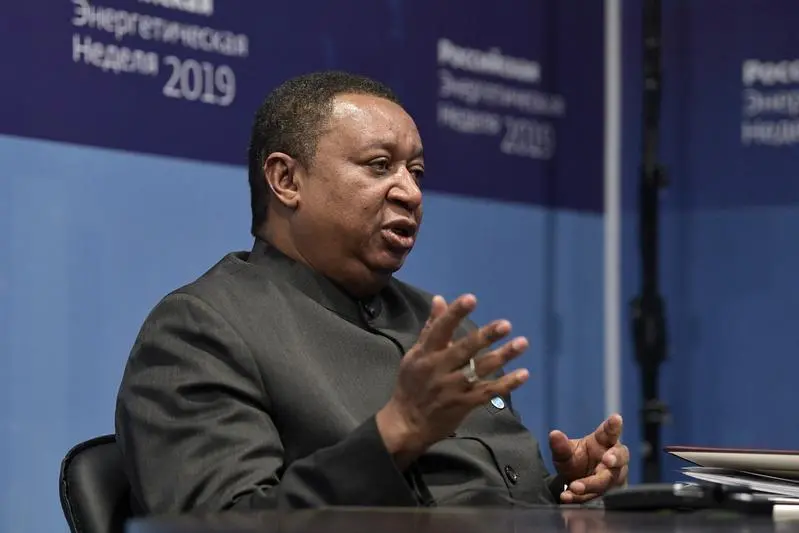PHOTO
With the departure of Nigerias Mohammed Barkindo, the age of the giants who head the secretariat of the Organization of Petroleum Exporting Countries will come to an end.
In six months, Kuwaiti Faisal Al-Ghais will replace Barkindo and manage OPECs affairs for another six years till the mid of 2028. By that time all those giants who were involved with the Vienna-based organization in the 1980s will no longer be in a condition to lead it.
Therefore, the arrival of Al-Ghais will signal a generational change and an end of an era and a start of a new one. Only those who were at OPEC when Saudi Ahmed Zaki Yamani and Kuwaits Sheikh Ali Al-Khalifa, can be labeled as giants.
That generation started their careers when OPEC was shaking the worlds politics. When meetings drag on for days and sometimes for weeks. When Iran and Iraq went into a war for eight years during which an Iranian oil minister, Mohammed Javad Tondguyan, was captured by Iraqi forces near Abdan. The Iranian delegation that attended OPEC meetings kept his seat empty with his photo on it and refused to take decisions unless he was back.
Those were the abnormal but golden days of OPEC when it controled more than half of the worlds production and its members countries fields were young enough to push oil with natural lift while US wells were running on submersive pumps. Those were the days when OPEC controled the worlds spare capacity and there were no alternative energy. It was also the period of mismanagement of oil resources and petrodollars, when countries think about spending as if there was no tomorrow.
Qatars former energy minister Abdullah Al-Attiyah, Bu Hamad, used to describe his involvement in those days by saying: I used to sit not in the front line or the second line behind the ministers, but in the third line. When Yamani and the other ministers entered the meeting room, I used to see them walking in front of me like giants.
To that era Barkindo, Abu Sadique, belonged. He was a young Nigerian assisting the late minister Rilwanu Lukman, who became the secretary general between 1995 and 2000. Oil veteran Mike Rothman recalled the time when Lukman along with Indonesian Subroto, who also headed OPEC 1988 and 1994, and Algerias Sadek Boussena were called the 3 wise men of OPEC.
The secretary generals job wasnt easy back then. Many countries were either at war or avoided speaking to each other. Wise countries or OPECs oil price doves like Saudi Arabia were pushing for reasonable oil prices, while OPECs price hawks such as Venezuela and Iran called for higher prices. So when the gap widens, it was the job of the OPECs head to bring everyone together. Sometimes the secretary general would need to circle the globe just to discuss price matters and get countries consent on many issues with some considered trivial such as which country would host a summit or a meeting.
Barkindo saw all this at an early start in his career. He learned everything from his mentor Lukman and that included diplomatic skills and when to speak or how one wouldnt be considered a foe. Sometimes it can get really tough. An OPEC head should be neutral but its very easy for any secretary general to be accused of conflict of interest if he walked the lines of his country. At the same time he can be blamed by his country for not defending its interest.
Things have changed now. There are no longer those long meetings and political battles. Things have changed since Ali Al-Naimi headed Saudi ministry of oil and brought with him the discipline he learned at Aramco.
It was Al-Naimi who started the de-politicization of OPEC that was accelerated later by his successor Khalid Al-Falih. This process is now advanced with the current minister of energy Prince Abdulaziz bin Salman, who is another OPEC giant as he started his career with the organization around 1987.
It doesnt mean that OPECs top job has lost its glamour. The circumstances have changed and it has become much easier now that OPEC and its allies in OPEC+ run the show. Yet politics will always remain, and representatives of OPECs countries at the secretariat must be managed well as they represent different backgrounds, cultures and interests.
The research role of OPEC now is eclipsing other traditional roles and this market orientation and understanding of the oil trading world is what would make the presence of Al-Ghais essential for the transformation of the secretariat into a real rival of the IEA.
Still, Ill miss the days of Barkindo and the era he represented. The era of the giants.
Wael Mahdi is a senior business editor at Arab News and co-author of OPEC in a Shale Oil World: Where to Next?
Twitter: @waelmahdi
Copyright: Arab News 2022 All rights reserved. Provided by SyndiGate Media Inc. (Syndigate.info).





















